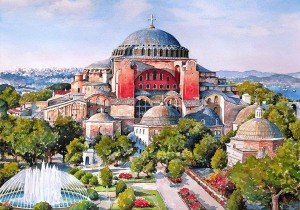 A true characteristic of our Church is that it is TRADITIONAL in a true sense of the word. By tradition we do not mean an unreasoned imitation of what our parents and past generations did! Tradition is not a body of legends which the naïve blindly accept without question! These are only popular notions that many have about tradition.
A true characteristic of our Church is that it is TRADITIONAL in a true sense of the word. By tradition we do not mean an unreasoned imitation of what our parents and past generations did! Tradition is not a body of legends which the naïve blindly accept without question! These are only popular notions that many have about tradition.
To Eastern Christians, Tradition, Scripture and spiritual authority are all interrelated subjects. We boldly assert that to understand the place of the Bible in the Church one has to first have a clear view of Christian Tradition. This is not because Scripture and Tradition are two very separate but equal sources of spiritual authority that as to be synthesized. It is, in fact, because they are inseparably related.
Tradition, as is true with many other Christian terms, holds different meanings for an Eastern Christian than it does for the average believer in the West. There is a truly distinctively Christian sense to Tradition. Our Church embraces the more Ancient Eastern Christian understanding of Tradition.
It must be noted that Divine Tradition is not the same as customs. Apostolic Tradition truly cannot be equated with “passed down customs or teachings”, though it can and does make use of these. Divine Tradition searches for ways to express the message of the Gospel in ways that we mortals can receive. Tradition gives birth to true customs, but they are not one and the same. While customs can be the vehicle that the Spirit uses to bear witness to Christ, they are not Tradition itself. This difference is very important. Some of our customs are not Divine Tradition and we must come to distinguish what is actual Tradition and what are just customs that have been added by our ethnic heritage.
Many people find it difficult to separate what are customs from Sacred Tradition. This Tradition, which has been handed down from the Apostles and the early Christian Church, is much different from the customs that every Eastern Church has developed. Our customs are Slavic and Ukrainian and, in the United States, also those of our early immigrants. They have been developed for various reasons over the years. They are not Sacred Tradition which is not man-made and is not confined to history. I will continue to try and explain what Tradition IS.
